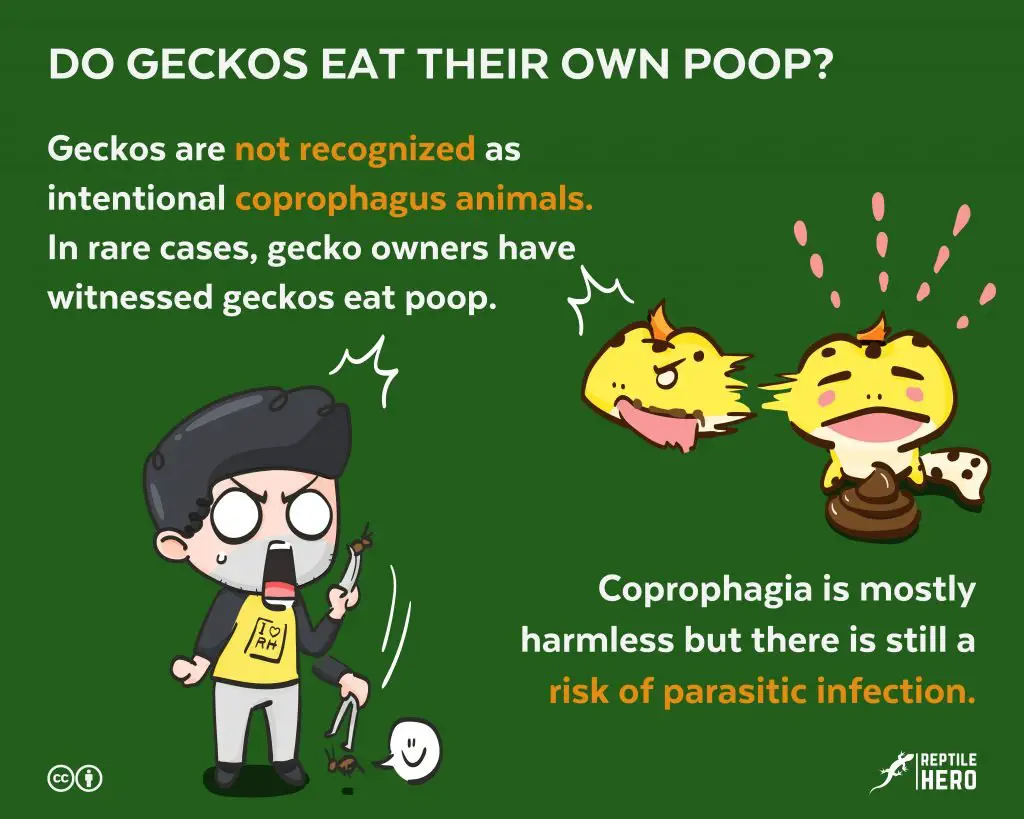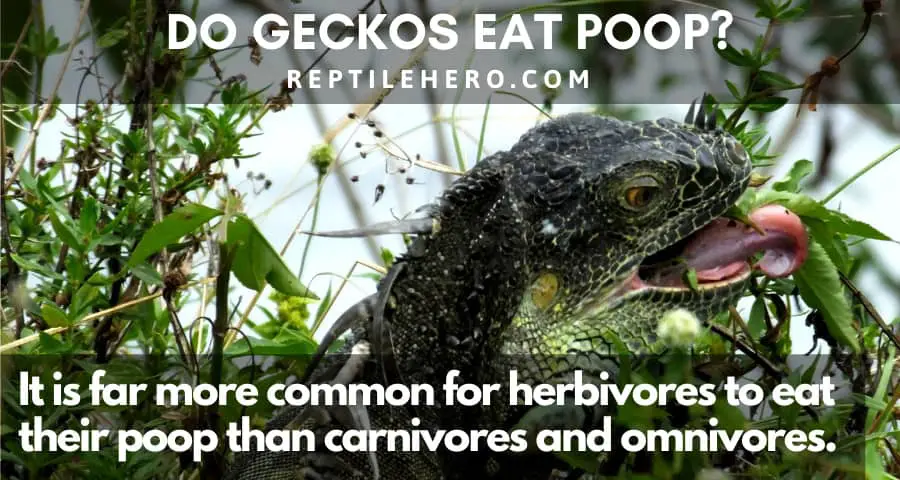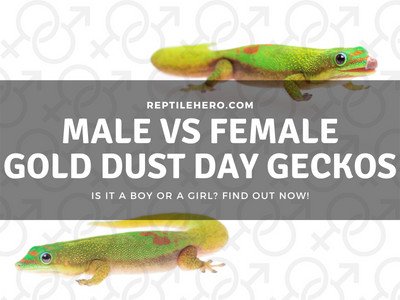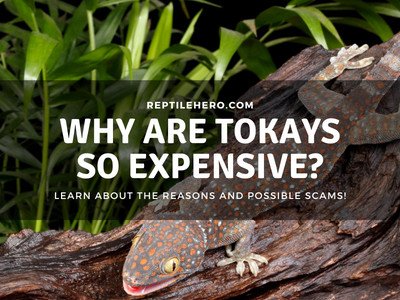Do Geckos Eat Their Own Poop? [The Science of Coprophagia]
When the word “poop” pops into our minds, we generally associate it with negative things: it’s stinky, unsightly, and just disgusting. Nothing about poop screams appetizing! But some animals surprisingly see poop as food―is your gecko one of them? Did you see him eating it?
Generally, geckos are not recognized as intentional poop-eating or coprophagous animals. However, in rare cases, pet keepers have witnessed geckos eat poop, mostly by accident or by mistake. Although coprophagia is mostly harmless, there is still a risk of parasitic infection and ingestion of a cage mate’s medication.
Most people would think that the consumption of feces is completely unhealthy and abnormal―for humans, that is indeed the truth. But for a few animals, poop serves as a gold mine for much-needed nutrients. Read on to find out more!

Coprophagia in Geckos: What Does it Mean?
Coprophagia or coprophagy is the scientific term used to refer to the act of animals eating feces which could either be their own or that of another animal’s―regardless of species [1].
The aforementioned terms come from two Greek words [2]:
- Copro which refers to excrement, dung, feces, or poop
- Phagy which denotes the act of eating or ingesting something
Do Geckos Eat Their Poop?
In extremely rare cases, geckos―and reptiles in general―do deliberately eat their own or another animal’s excrement under normal. However, more often than not, geckos do not engage in coprophagia deliberately.
As a result, coprophagy is neither well researched nor well documented in geckos. Most knowledge and information we regular keepers can find on the topic is based on anecdotes of pet keepers and breeders.
In the cases where geckos indeed eat poop, it is commonly due to the fact that they have confused their poop with an insect or worm.
There are also frequent stories of captive-bred pet geckos accidentally ingesting poop due to its close proximity to prey insects in the tank. All in all, geckos do not normally and intentionally eat poop.
On the other hand, gecko keepers commonly but mistakenly think that their pet ate poop because of one main reason in particular―the gecko’s poop just disappeared into thin air without the owner’s intervention (e.g., spot-cleaning).
But remember: feces can be naturally broken down and some geckos have a habit of burying their droppings. So don’t assume that a gecko has eaten poop unless you actually see it do so right before your eyes or with the help of a pet camera in its tank.
Do geckos like to eat poop?
Geckos have been observed to immediately try to spit out feces when they accidentally ingest it, so most keepers are of the opinion that geckos do not typically like or enjoy consuming poop.
Why Would a Gecko Intentionally Eat Poop? (2 Major Reasons)
Despite the lack of research on gecko coprophagia, it is theorized that geckos intentionally eat feces for 2 specific reasons:
- Nutrient deficiency: to make up for certain nutrient deficiencies in its current diet.
- Lack of readily available food: to consume undigested/partially digested food items in the excrement and avoid food wastage.
In other words, poop-eating or coprophagy in geckos may simply be a demonstration of opportunistic feeding, especially in wild geckos.
Since the availability of food is highly variable and many bigger competitions, as well as predators, are present in most gecko species’ natural habitats, geckos will instinctively want to make the most of out of every food item they get―even if they or another animal has already let it out of their system.
Although the nutritional value of feces is remarkably lower than fresh fruits and live feeder insects, it is still better than nothing for a starving gecko.
Reptile Diet, Digestion, and Coprophagia

Herbivore reptiles tend to consume their poop more often than insectivorous or carnivorous reptiles. Coprophagia is commonly reported in strictly herbivorous reptiles such as:
- Prehensile-tailed skink (Corucia zebrata)
- African spurred tortoise (Geochelone sulcata)
- Californian desert tortoise (Gopherus agassizii)
- Common green iguana (Iguana iguana)
Herbivorous reptiles primarily consume leafy plant matter which is harder to digest because of its high cellulose content [3]. For this, their cecum, which lies in between the small and large intestine is of great importance as it greatly helps in plant digestion and nutrient absorption [4].
Unfortunately, even with a functioning cecum, plant matter can still be excreted as incompletely broken down food that still has unutilized nutrients (e.g., vitamins, minerals, amino acids, etc.) left in it.
In effect, herbivorous reptiles would have to ingest their feces to maximize the nutrient content of plant matter. Besides this, it is also speculated that the microorganisms and bacteria in fresh feces replenish their gut flora.
So, what about geckos?
Most geckos, which are either insectivorous carnivores or frugivorous omnivores, neither consume large amounts of leafy plant material nor possess a functioning cecum, unlike strictly herbivorous reptiles. Hence, they do not ordinarily need to re-ingest plant-filled poop for better digestion as it is unnecessary.
Is it Safe for Geckos to Eat Poop?
Broadly speaking, healthy geckos can consume poop without any ill effects. However, the actual safety of coprophagia in geckos is relative to the risk of 1) parasitic infection and 2) ingestion of medication.
As explained earlier, it is extremely unusual for geckos to eat poop―and when they do, they eat poop out of necessity to compensate for deficiencies in their diets. But this doesn’t mean that coprophagia is entirely harmless.
Here’s the problem: We don’t know if ingesting feces is only safe until a certain amount. Plus, we are totally in the dark when it comes to the long-term effects of coprophagy in geckos.
On one hand, it could be safe, on the other, it could be lethal.
Personally, I strongly advise against letting your geckos eat poop, regardless of whether or not it is their own poop. Especially since there are serious risks to letting your pet geckos consume feces.
#1 – Parasitic Infection
The most apparent risk of coprophagia is the ingestion of fecal material that contains intestinal parasites and other pathogens. These pathogenic bacteria include Staphylococcus and Salmonella.
You as the owner are also at an elevated risk of catching a pathogen and/or parasite if your gecko engages in coprophagia.
Solutions: Maintain proper hygiene in your gecko’s tank. Clean and disinfect your gecko’s tank and furnishings in a dedicated area. Wash your hands before and after handling sessions. Never kiss your gecko. Bring the gecko to your exotic vet if you notice odd behaviors after witnessing it ingest poop.
#2 – Ingestion of Medication
This second risk is Geckos who are provided out-of-the-tank enrichment activities may inadvertently pick up prescription medicine from the feces of other pets in the house. Although the likelihood of this happening is much more unlikely, it is still worth noting.
Geckos kept in a large vivarium with a breeding mate or a small group may also experience this if one gecko is put on medication but is not kept in a separate tank―hospital or quarantine set-up.
(Check our previous article on “cohabbing” or housing leopard geckos together to learn why we don’t recommend it.)
Solutions: Make sure the environment is free of feces before letting your gecko roam. House your geckos separately.
How Do You Prevent Geckos From Eating Poop? (5 Tips)
If you want to prevent your gecko from engaging in coprophagia, try out any or all of the following:
- Ensure that your geckos have a balanced diet
- Promptly remove feces (spot-clean)
- Train your gecko to only poop in one area
- Do not let your gecko hunt in the general area it defecates
- Switch to a completely bioactive set-up
Nevertheless, it is advisable to get in touch with your local exotic veterinarian if your gecko starts displaying odd behaviors and symptoms after ingesting poop―be it deliberately or unintentionally―like lethargy and loss of weight.
What About Coprophagia in Other Non-Reptile Animals?
Overall, coprophagia is considered a more common and natural behavior among many mammals and insects [5]. For some, it is only done during the early stages of development, whereas it is a life-long activity for others.
Coprophagia is considered normal and healthy for the following animals:
- Rabbits and hares
- Rats and mice
- Foals (young horses)
- Dogs (puppies and bitches)
- Dung flies and beetles
- Non-human primates
The occurrence of poop-eating in the aforementioned animals is more prevalent and also receives much more research and medical attention, so it is better investigated in non-reptiles.
Other medical and behavioral causes of non-reptile coprophagy may include:
- Gastrointestinal issues
- Parasitic infections
- Unbalanced and/or nutrient-deficient diets
- Provision of easier-to-digest food for offspring
- Innate grooming behavior of maternal animals
- Evasion of predators with sensitive noses
- Conditioned response to owner’s excessive reaction
- Compulsive behavior related to maintaining cleanliness
- Dysfunction or decline in cognition
- Stress and anxiety
- Boredom or lack of enriching activities
Do keep in mind that despite being mostly related to and observed in non-reptile animals, the first three medical causes of coprophagia may also be applicable in some reptile species.
Takeaways
Geckos do not normally engage in coprophagia, the act of eating feces, with the intention of doing so. It is normally done accidentally.
There are 2 factors that may lead to coprophagia in geckos: nutrient deficiency and the lack of readily available food.
Although geckos may remain healthy and active after consuming some amount of fecal matter, there is still a risk of parasitic infection as well as ingestion of medication. Hence it is recommended that keepers do not let geckos eat excrement.
Sources
[1] https://babel.hathitrust.org/cgi/pt?id=coo.31924051143075&view=1up&seq=383
[2] http://www.anapsid.org/coproph.html
[3] https://www.intechopen.com/chapters/52743
[4] https://www.britannica.com/science/cecum
[5] https://www.sciencedirect.com/topics/agricultural-and-biological-sciences/coprophagy

![Why Does Your Gecko Lick? [You, Themselves, and Other Objects]](https://www.reptilehero.com/wp-content/uploads/2021/05/gecko-lick-object-cc-768x614.jpg)
![What Do Gecko Eggs Look Like? [Size, Color, and More]](https://www.reptilehero.com/wp-content/uploads/2021/03/word-image-25-768x576.png)

![Is It Possible To Overfeed A Gecko? [4 Signs]](https://www.reptilehero.com/wp-content/uploads/2021/12/overfed-gecko-cc-768x614.jpg)

![10 Reasons Why Your Gecko Is Sneezing [With Solutions]](https://www.reptilehero.com/wp-content/uploads/2021/03/Why-gecko-sneeze-cc-768x614.jpg)